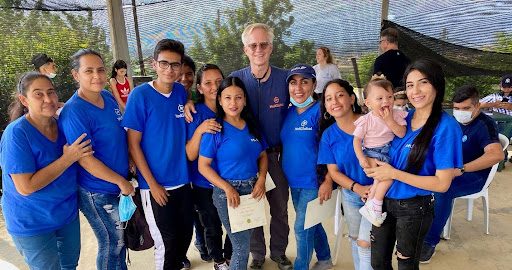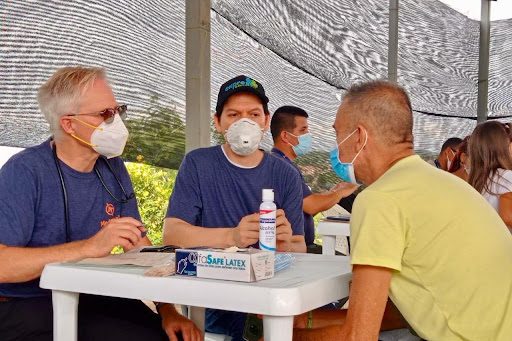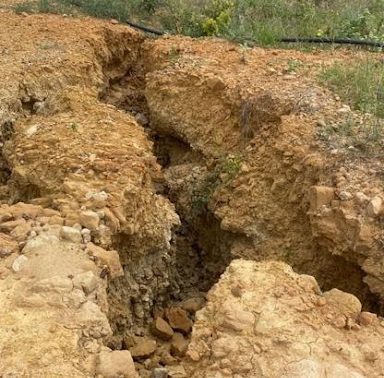Updates & Press
Featured | December 3, 2021
Roads, Roofing Tiles, and Brigades: A Medical Volu
Author | MedGlobalComms

By Richard Scott, MD, medical volunteer of MedGlobal’s November 2021 short-term medical intervention in Colombia.
In joining the MedGlobal Brigade in Colombia, I was not sure what to expect. As a doctor who recently retired from family practice in Canada, I would be helping to provide primary medical care to refugees and migrants from Venezuela. I expected a refugee “camp” like the ones I had seen on the border between Myanmar and Thailand – enclosed settlements with fences, gates, and patrols keeping the refugees in the camp and out of a national economy. Because I knew millions of Venezuelans had fled on foot after the collapse of the Venezuelan economy and healthcare system, I expected such camps might be large.
I was pleasantly surprised to find no such camps. The Duque government’s open-door and rapid integration policies meant Venezuelan refugees were encouraged to move on from the border with the goal of integrating them into the broader national economy. Among the consequences of such policies, one result is that there are no prison-like refugee camps on the border.
Although Colombia has a sophisticated health care system, most access to it is private, either through direct payment or work-related health insurance. The poor have access only to the public components of the system, primarily for non-emergency care. As non-citizens, Venezuelan refugees have even less access.
The MedGlobal Brigade works with a relatively poor but open and developing community on the outskirts of Cúcuta called El Talento, which is home to about 5000 people. Approximately 70% of the community are settled Venezuelan refugees and the rest are internally displaced Colombians. Most of the residents have been living in El Talento for several years.
On the walk up from the main road into the community, apart from the friendly and enthusiastic welcome we received, what struck me first was how rutted the red dirt roads were, with deep gouges recently carved out by rains, passable on foot but barely passable on wheels. On our third day at the road leading into the community, a string “gate” appeared, held aloft by a ten-year-old boy near the entrance, jar in one hand extended for a toll. I asked him what the money was for and was told it was for “this” – pointing at a few truckloads of broken clay roof tiles that had been dumped at various sites along the way up the hill. He was collecting donations for the community to pay for the tiles.
The houses in El Talento were mostly of rudimentary brick or wood construction, some with poured concrete floors, many with just dirt floors. They had access to running water about once a week through a system of PVC pipes buried along the edges of the road that are prone to breaking. Residents stored water in pails or plastic barrels until the water was next available.
On a walk through the community to a house call with a community health worker and a translator, we helped a young woman carry a perambulator with her baby in it. The road in places was so rutted or steep she couldn’t roll it.
On the way home, we came upon a group of children, the oldest of them perhaps 12, vigorously and joyfully spreading a truckload of clay roof-tile gravel on the road along with a couple of adults who were supervising and breaking up the larger chunks of tile with a sledgehammer. The children were laughing and digging in happily. They were clearly having fun.

For me, the communal use of these discarded and broken tiles was emblematic of a low-tech, low-cost approach to a difficult community problem. It could be implemented immediately. People worked together to use available resources to make a difficult situation better.
This is also true of MedGlobal’s approach to providing primary care in El Talento. Working with community leaders, health workers, translators, local volunteers – and on our trip an optometrist, and several Venezuelan, Canadian and American physicians – MedGlobal has organized successive “brigades” to provide El Talento with primary care and diagnostic tools that they would not otherwise have access to. In this analogy, you might consider the members of the brigades a part of the community. Continuity of care is achieved through MedGlobal’s organization of successive brigades, and by referral to a permanent clinic of Colombian doctors supported by MedGlobal in nearby Cúcuta.
As a family doctor, I found my work much like the work I do in Canada, albeit in a very different setting and with a much more limited set of diagnostic or referral resources. Instead of a private office and exam room, I worked at a plastic table in a noisy communal area that was ordinarily used for church services and other community meetings. It was an open area under an awning on a slope with rows of concrete steps leading down to a stage at the bottom where we worked, plastic chairs on the steps serving as an open waiting area. Many of the problems I was asked about were like the ones I would see at home: hypertension, diabetes, musculoskeletal aches and pains, and many parents concerned about their children’s appetite, growth, and development. Starvation was not an issue but malnutrition and failure to thrive certainly were, compounded by a high prevalence of h. pylori infection, intestinal worms, and parasites.

I listened carefully and provided what care I could. When stumped, I consulted the Venezuelan doctors who knew the local epidemiology, needed no translator, and could work twice as fast as I could. The patients who came were invariably respectful and extremely grateful for what limited advice and care I could provide. I thought how fortunate I was to live in Canada, a country with a strong universal healthcare system where access to medical care does not depend on nationality, income, or employment status, and where I was able to have been well-paid for my part in providing such care.
Consider the brigades again by analogy with the roof tiles. Members of the brigades are the roof-tiles, a temporary, imperfect, but perhaps useful resource, brought in by the community from the outside to improve a challenging situation, in which inequality and poverty preclude access for the time being to a more permanent solution. On the other hand, by engaging with the members of El Talento, members of the brigades broaden our own definitions of community to include each other. If I can see myself in this way as part of a broader community there is hope and some fun in also being a fragment of a roof-tile.




